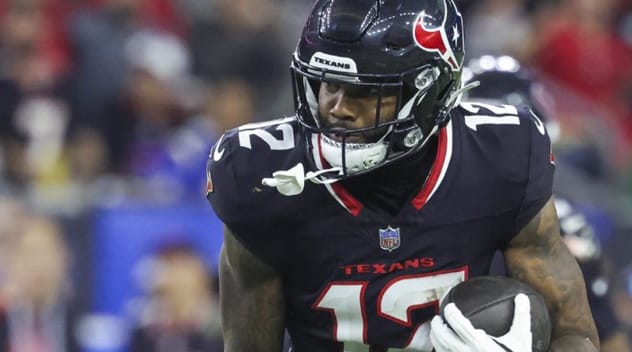Here are some of the job battles to change most over the last week. Click the past writeups below for prior context on the job battles throughout the league.
Detroit RBs, Washington RBs, and Philadelphia WRs
Indianapolis RBs, San Francisco RBs, and San Francisco WRs
Kansas City RBs, Washington WRs, and Atlanta WRs
Tampa Bay RBs, New England WRs, and Las Vegas WRs
Rams TEs, Pittsburgh RBs, and Atlanta RBs
Denver WRs, Tennessee TEs, and Philadelphia RBs
Buffalo RBs, Minnesota RBs, Detroit WRs
Kansas City WRs
Rams RBs
Miami RBs, Cleveland WRs
Jacksonville WRs, Seattle TEs
August 3: KC RB update, TB RB update, GB WRs, PHI WRs, DET WR update, WAS WR update
August 10: WAS RB update, LV WR update, PIT RBs update
August 17: SF RBs and WRs update, Jets TEs update, Tampa TEs update
Rams Running Backs
Cam Akers
Darrell Henderson (hamstring)
Malcolm Brown
John Kelly
Cam Akers had been getting sprinkled into the first-team practice reps from the start of the Rams training camp, but he should be there on a full-time basis until further notice after 2019 third-round pick Darrell Henderson suffered a hamstring injury, one described as minor but implicitly has him questionable for Week 1 all the same. If Henderson is looking at an absence of up to three or four weeks, then the hamstring probably suffered an injury worse than 'minor.' If so, then Henderson could need time not just to recover but even reestablish his role in practice upon his return, which means a clear runway for Akers in the meantime.
Akers (5-10 217) doesn't really have a workhorse build, but he boasts clearly above-average linear athleticism (4.47 40, 35.5-inch vertical, 122-inch broad jump). His lateral athleticism isn't as obvious to measure, but on tape he shows plenty of balance and motor, which should be enough to allow said linear athleticism make him an above average overall functional athlete by NFL standards. Akers lowers his center of gravity heading into traffic and keeps his balance better than most as he does so, so he adds a functional power element in addition to his ability to burst upfield. He also appears to be a competent pass catcher. Overall, there's reason to see a three-down skill set with Akers, and a frame that should be able to withstand a good amount of volume.
Henderson and to a lesser extent Malcolm Brown pose (posed?) a threat to limit Akers' volume to begin the year, but the calculus is a lot different if Henderson is unavailable or limited. Brown is a big, reliable back who the Rams trusted in short-yardage and passing down situations last year, but that's all he can realistically contribute. Perhaps fourth back John Kelly would pick up some of the usage in the event that Henderson sits, but he's a mediocre prospect and the slack could just as easily go straight to Akers.
If Henderson can get past his hamstring issue in due time then there should be a role available for him upon his return, especially between the 20s and in hurry-up type situations. Henderson was an incomparable big-play threat at Memphis in college, notably outplaying fellow NFL backs Tony Pollard, Antonio Gibson, and Patrick Taylor, so Henderson almost certainly has skill to offer despite the turbulent start to his career. His split is unlikely to register at the level it might have if he hadn't suffered the injury, though.
Cincinnati Wide Receivers
Tyler Boyd
A.J. Green (hamstring)
Tee Higgins
John Ross
Auden Tate
Tyler Boyd and A.J. Green are clearly the top two guys here, whichever order you prefer, though Green is currently missing time with a hamstring issue and obviously has an extensive recent injury history before that. The Bengals will log a lot of wide receiver snaps and routes aside from them, though, and particularly if Joe Burrow is good the Bengals will likely have a third fantasy factor at receiver, and maybe even a fourth.
The battle behind Boyd and Green takes place between John Ross, who just returned from the COVID reserve list after caring for his son and the child's mother in California, Tee Higgins, who just returned to practice from a hamstring injury, and Auden Tate, who heads into his third year with the Bengals as a former seventh-round pick out Florida State. The trio is varied in its traits and skill set, offering excellent depth to the Bengals rotation in general and creating viable breakout routes for each. It's also possible, though, that each of Ross, Higgins and Tate prove too competent for any one of the three to accumulate much volume as they all take stabs at the same pie.
Camp reports on Burrow seem promising to this point, though, and Tate has consistently been on the receiving end of some of Burrow's most notable throws, especially in the red zone. This makes sense – Tate is the biggest Bengals receiver at 6-5, 228, and he was something of a red-zone specialist in college, where he turned 65 receptions into 16 touchdowns in two years. The catch is that Tate looks like a red-zone specialist in large part because his athleticism isn't threatening between the 20s – his 4.68-second 40, 31-inch vertical and 112-inch broad jump were all brutal, even for a big receiver. Playing at about 22.5 years old last year, Tate drew encouraging target volume (80 targets on 666 snaps, 1.46 air yards per snap), but the quality of those targets might be problematically low, because he caught only 40 of them for 575 yards and one touchdown. In his 12 active games the Bengals completed 59.3 percent of their targets at 6.7 yards per attempt, while Tate caught 50 percent of his targets at 7.2 yards per target. The 0.5-yard surplus is probably negated by the 9.3-point catch rate discrepancy, so it probably qualifies as below baseline.
Higgins isn't a guarantee to provide an above-baseline option as a 21-year-old rookie, but at 6-4, 216 he has the frame to threaten Tate for the Big WR functions. As much as Higgins' pro day workout numbers were poor (4.59 40, 31-inch vertical, 123-inch broad jump), they're more forgivable given his big frame, and the concern is all but washed away by Higgins' exceptional age-adjusted production at Clemson. Each year in college Higgins blasted past the Clemson base line, including a 2019 season where he caught 65.6 percent of his targets at 13.0 yards per target in an offense that completed 64 percent of its attempts at 8.5 yards per attempt. Higgins' per-target yardage number would have been even higher if the end zone hadn't 'tackled' him on 13 of those 59 receptions. Higgins' production was so dominant at Clemson that it nearly erases any functional athleticism concerns – it seems more likely the case that even if he's a below average athlete, his skill level is so far above the average that it results in an above-average player anyway. If he does, it's Tate's problem first and foremost.
If Higgins is good enough to breeze past Tate, though, then it would also make Higgins at least a slight problem for Ross. Although Ross is much smaller (5-11, 188) and much faster (4.22 40) than Higgins, the two both project for downfield functions in the offense, even if they win in different ways; Ross with speed and Higgins with catch radius. Ross dropped too many passes last year but was somewhat productive all the same in his eight games, drawing 56 targets on 410 snaps while generating 2.07 air yards per snap (95th percentile). It makes sense for the Bengals to keep tapping into that air-yardage ability of Ross', especially between the 20-yard lines, but the addition of Higgins gives them the luxury of scaling back Ross' share of the offense in hopes of minimizing his drops exposure.
Expect the Bengals depth chart to shake out something like this order:
Outside: A.J. Green, Tee Higgins, John Ross, Tyler Boyd, Auden Tate
Slot: Tyler Boyd, John Ross, A.J. Green, Tee Higgins, Auden Tate
New England Tight Ends
Devin Asiasi
Dalton Keene
Ryan Izzo
Jake Burt
Following Matt LaCosse's decision to opt out of the 2020 season, Ryan Izzo was the most senior remaining member of the Patriots tight end rotation. Izzo was actually quite busy in the first six games, in which he played all of his 271 snaps, but then he suffered a concussion and was a healthy scratch the rest of the year afterward. At 6-5, 256, Izzo should make the team and might play hundreds of snaps as a blocking-oriented tight end, but his 4.94-second 40 casts doubt on his ability to earn targets. If not Izzo, then undrafted rookie Jake Burt might be a candidate to serve as a blocking specialist this year.
When it comes to targets, though, then we're probably just looking at the duo of rookie third-round picks: Devin Asiasi (UCLA) and Dalton Keene (Virginia Tech). Asiasi is the older (23) and stockier (6-3, 257) of the two, so he might be the better option of the two for in-line functions. Keene's youth (turned 21 in April) bodes well for his long-term upside but might work against his chances of earning an immediate role. Asiasi didn't break out until his age-22 season at UCLA last year, and Keene won't be Asiasi's current age until April of 2022. Despite the age disadvantage, Keene still has good frame (6-4, 253) and is the superior athlete between the two – even though Asiasi himself is likely an above-average athlete (4.73 40). Keene is one of the most athletic tight ends prospects in the league, though, boasting a superior 40 (4.71) as well as excellent composite athleticism with a 34-inch vertical, 125-inch broad jump and 11.26 agility score.
Asiasi has drawn praise for his training camp work and seems to be ahead of Keene in New England's preliminary depth chart, so Asiasi probably has to be the presumptive leader here until further notice. Keene might be the type to gain ground quickly, though, and in the meantime it looks like the two might have distinguished functions – Asiasi more or less function as a pure, traditional tight end while Keene motions around, blurring the line between tight end, h-back and fullback. If they're both on the field at the same time and seeing to different tasks, then it's possible that Asiasi and Keene might coexist rather than face off in a zero-sum scenario. Keene's prospects for immediate playing time almost certainly rose with the opt-out of Dan Vitale, who was supposed to handle the h-back and fullback functions in this offense, including as a pass catcher. Vitale caught tons of passes at Northwestern and if Bill Belichick had any similar functions in mind in New England, then that role might go to Keene.
Chargers Running Backs
Austin Ekeler
Joshua Kelley
Justin Jackson
Austin Ekeler won't have as good of a pass-catching season this year as he did in 2019, but part of why he might withstand that fact is due to the departure of Melvin Gordon from the offense, which accounted for 162 carries and 55 targets on 433 snaps in 12 games. At 5-9, 200, though, Ekeler isn't built to withstand that new burden on his own. The question of the Chargers' RB2 role, then, is one that could hold significant repercussions for fantasy players searching the margins for under the radar running back production in 2020.
Of course, part of what allowed Ekeler to accumulate 132 carries and Gordon 162 was the fact that Jackson missed nine games last year, with first a calf issue and then a hamstring injury later in the year. Not just that, but replacing Philip Rivers with Tyrod Taylor will likely poach a few carries from the running backs unless the Chargers throw the ball less than in past years. Even if/when Justin Herbert replaces Taylor, Herbert too will run the ball more than Rivers would have. So we might want to sooner project 300 carries for the top three Chargers running backs rather than the 323 they logged last year.
At the start of Chargers training camp it was Ekeler with the first team, Jackson second, and Kelley third. As a third-year player and the main backup to Ekeler last year when Gordon held out, it makes sense for Jackson to begin training camp in the same capacity. In recent days, though, it hasn't protected him from Kelley gaining ground. A fourth-round pick out of UCLA, Kelley has the pedigree advantage over Jackson, a former seventh-round pick, and at 5-11, 212 pounds Kelley is much more densely built than the 6-0, 199-pound Jackson. That density distinction is important for running between the tackles, which is the primary task the two are candidates for given Ekeler's rare abilities as a space back. Not only does Kelley have double-digit pounds on Jackson at about an inch shorter, he also has a better 40 time (4.49) than Jackson (4.52).
With this athletic advantage in his favor, we might have predicted that he would gain ground on Jackson as camp progressed. This seems to have happened already, with the Orange County Register saying Jackson and Kelley appear "neck and neck" for the RB2 role behind Ekeler. Then coach Anthony Lynn said, "[Kelley] learns quickly and he's a very instinctive runner. I love his background and the grit that he has. Just an outstanding young man."
If Kelley displaces Jackson as the team's main between-the-tackles specialist, then it would probably reduce Jackson to a sort of swing-backup type for both Ekeler and Kelley's respective functions, but rarely a consideration for a lead role in either of them. There's no evidence that Kelley is a lesser pass-catching running back than Jackson, though, so it's possible that Jackson might just end up being the clear RB3 rather than a near-equal of Ekeler or Kelley.






































